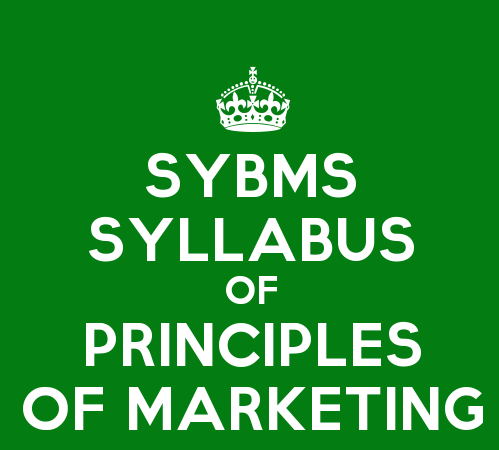SYBMS Sem 3 Syllabus: Principles of Marketing
In Principles of Marketing subject, you will learn and understand about the marketing philosophies and ethics, competitive advantage, marketing environment, international marketplace, consumer decision making, business marketing and marketing research, segmentation and product marketing, product management and retailing, services marketing and supply chain management, promotion, advertising, public relations, selling and pricing strategy.
You will learn to think like a marketer and begin to ask yourself questions like what does the consumer need, what does the consumer like and how to communicate with the consumer and so on.
Why to study Principles of Marketing?
1) To study basic concepts in marketing applicable to business.
2) To critically analyse the marketing theories and concepts and understand their relevance in perspective to current business scenario in India.
3) To develop basic marketing skills among students in order to cater to the needs of marketing industries.
The subject has to be learnt in 60 lectures and 3 credit.
There are 4 main units in Principles of Marketing subject.
Unit 1 – Introduction to Marketing
Unit 2 – Marketing Environment, Research and Consumer Behaviour
Unit 3 – Marketing Mix
Unit 4 – Segmentation, Targeting and Positioning & Trends in Marketing
The topics that are covered in each unit are as follows:
Unit 1 – Introduction to Marketing – 15 lectures
- Definition,
features,
advantages and scope of marketing.
The 4P’s
and 4C’s of marketing.
Marketing v/s Selling.
Marketing as an activity and function.
- Concepts of Marketing:
Needs,
wants and demands,
transactions,
transfer and exchanges.
- Orientations of a firm:
Production concept;
Product concept;
selling concept and
marketing concept,
social relationship,
Holistic marketing.
Unit 2 – Marketing Environment, Research and Consumer Behaviour – 15 lectures
- The micro environment of business:
Management structure;
Marketing Channels;
Markets in which a firm operates;
competitors and stakeholders.
- Macro environment:
Political Factors;
Economic Factors;
Socio-Cultural Factors,
Technological Factors (PEST Analysis)
- Marketing research:
Meaning,
features,
Importance of marketing research.
Types of marketing research:
Product research;
Sales research;
Consumer/customer research;
production research.
- MIS-
meaning,
features and
Importance.
- Consumer Behavior –
Meaning,
feature,
importance,
factors affecting Consumer Behaviour.
Unit 3 – Marketing Mix – 15 lectures
- Product-product mix-
product line lifecycle-
product planning –
New product development-
failure of new product-
Levels of product.
- Branding –
Packing and packaging –
role and importance
- Pricing –
objectives-
factors influencing pricing policy and
Pricing strategy.
- Physical distribution –
meaning –
factor affecting channel selection-
types of marketing channels.
- Promotion –
meaning and significance of promotion.
Promotion tools (brief)
Unit 4 – Segmentation, Targeting and Positioning & Trends in Marketing – 15 lectures
- Segmentation –
meaning,
importance,
basis
- Targeting –
meaning,
types
- Positioning –
meaning –
strategies.
- New trends in marketing –
E-marketing,
Internet marketing and
marketing using Social network.
- Social marketing/ Relationship marketing.
Reference Books:
- Kotlar, Philip, Marketing Management, Prentice Hall, New Delhi.
- Stanton, Etzel, Walker, Fundamentals of Marketing, Tata-McGraw Hill, New Delhi.
- Saxena, Rajan, Marketing Management, Tata-McGraw Hill, New Delhi.
- McCarthy, E.J., Basic Marketing: A managerial approach, Irwin, New York.
- Pillai R S, Bagavathi, Modern Marketing




42 Comments